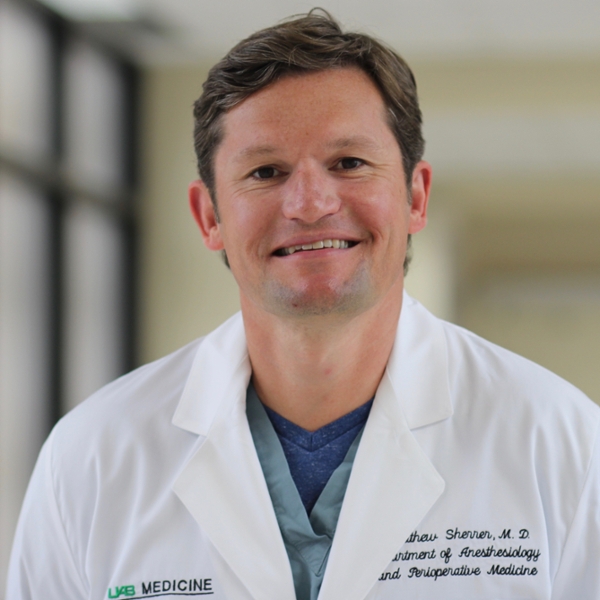Published on May 7, 2020 by Morgan Black

In 2015, local physician Matt Sherrer was president of a large private practice firm in Birmingham, leading more than 30 medical partners and 150 anesthetists. As the business head of the firm, Sherrer realized that he had not received any formal business training throughout his many years of medical school.
“I was running a big private practice group, and I realized that I had no leadership skills, no business skills, and that my medical school training had taught me none of that,” Sherrer said. “It taught me how to be a great physician, but nothing about the business of medicine or business in general.”
Sherrer began researching master of business administration (M.B.A.) programs and found that most are cohorted, meaning you start and end with one group of students. “As a husband, a dad, a busy physician and a group administrator, I didn’t feel like I could commit the time that a 22-year-old, fresh out of college student could commit to a cohorted M.B.A. program.”
Then Sherrer met with Samford University’s senior associate provost Howard Finch, Brock School of Business dean at the time, to learn more about Samford’s approach to the degree. Finch explained that Samford allows students to take the degree at their own pace. In addition, Samford’s approach truly emphasizes the value of quality over quantity – pursuing the M.B.A. at Samford is not just about adding three letters behind your name, but more about superior, ethical business training for the student. “I really appreciated him taking the time to share Samford’s approach – it’s one of the main reasons I chose the program,” Sherrer added.
He said he also chose the program because of the wholesome experience he would receive through obtaining a Samford degree.
“I knew that if I could go through medical school and residencies, I could do this,” Sherrer said. “I was surprised by how much work and how ‘not easy’ it was. But the faculty was very willing to work with me. Because of these relationships I gained with the faculty, I have a real understanding of the concepts.”
Being one of the older students in the program, Sherrer said he was inspired by the young students’ energy, and hopes his experience was valuable to them. “There’s certainly value to waiting a little while to participate in a program like this," he said. “I hope I was able to bring a little bit of real-world perspective to the conversations in my classes.”
Sherrer now practices anesthesiology at UAB Medicine. Although he is no longer working as a private practice administrator, he said that his new business knowledge obtained through the M.B.A. program is still very applicable as he interacts with medical residents and shares what he has learned.
“We still don’t train our residents to be savvy in business or to be leaders in healthcare,” he said. “We desperately need leaders in healthcare.” In response to that need, Sherrer is now dedicating himself to implementing a “transition to practice” curriculum to help anesthesiology residents develop a business of medicine understanding and business leadership skills.
In addition to sharing what he’s learned with others, Sherrer said receiving his M.B.A. from Samford will help him in his own career and in his personal life, and it could do the same for other medical professionals. “I hope I’m able to convey to other physicians that Samford’s program is special and offers great flexibility,” he said.
Working at his own pace, taking mostly online classes during late nights, Sherrer earned his degree in five years, graduating this May. “I want to teach my kids to finish what you start,” he said. “There’s something to be said for taking your time and not rushing through something to really get a valuable experience.”
Located in the Homewood suburb of Birmingham, Alabama, Samford is a leading Christian university offering undergraduate programs grounded in the liberal arts with an array of nationally recognized graduate and professional schools. Founded in 1841, Samford enrolls 6,324 students from 44 states, Puerto Rico and 16 countries in its 10 academic schools: arts, arts and sciences, business, divinity, education, health professions, law, nursing, pharmacy and public health. Samford is widely recognized as having one of the most beautiful campuses in America, featuring rolling hills, meticulously maintained grounds and Georgian-Colonial architecture. Samford fields 17 athletic teams that compete in the tradition-rich Southern Conference and boasts one of the highest scores in the nation for its 97% Graduation Success Rate among all NCAA Division I schools.

